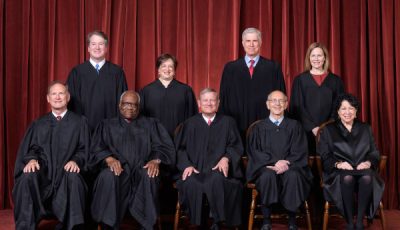Appellate Court: In Itself, Being Almost Naked Isn’t ‘Expressive Conduct’
 SEATTLE – If only they had performed exotic dance routines as they served coffee, the employees of “bikini barista” stands in Everett, Washington might have had a case.
SEATTLE – If only they had performed exotic dance routines as they served coffee, the employees of “bikini barista” stands in Everett, Washington might have had a case.
Granted, that’s not precisely what the recent decision by the U.S. Court of Appeals for the Ninth Circuit said in its recent ruling in the case Edge v. City of Everett, but it is the gist of one aspect of the court’s ruling.
At issue in the case are some bikini barista stands which have operated in the Everett area for at least the last 10 years. At the term for such stands suggests, they feature scantily clad employees serving coffee and other beverages. Shortly after the first of these stands opened, the Everett Police Department (EPD) began receiving complaints about lewd conduct taking place at the stands – including one customer waiting in line who was “clearly touching his genitals through his clothes as he was waiting his turn.”
One fact not disputed in the case is that while the stands may be called “bikini” barista stands, “their attire is significantly more revealing than a typical bikini,” as Judge Morgan Christen put it in the court’s ruling last week.
“The district court’s finding that at least some of the baristas wear little more than pasties and g-strings is well supported by the record,” Christen added.
To make a long story short, while the EPD was able to document a variety of violations of the City’s existing lewd conduct ordinances, the investigations required to witness and record those violations were deemed too expensive and time consuming to justify, in part because “policing the stands detracted from EPD’s efforts to address the City’s other priorities.”
Instead of enforcing the City’s existing ordinances against the barista stands, local officials decided to amend its statutory definition of “lewd act” to include areas of the body typically left uncovered by the baristas. The City also created a new offense, “Facilitating Lewd Conduct,” under which an “owner, lessee, lessor, manager, operator, or other person in charge of a public place” is guilty of Facilitating Lewd Conduct if that person “knowingly permits, encourages, or causes to be committed lewd conduct” as it is now defined in the ordinance.
Jovanna Edge, the owner of a bikini barista stand, and several of her employees sued the City over the amended ordinance, and the district court granted the plaintiffs’ motion for a preliminary injunction and enjoined enforcement of the revised ordinance. The City appealed – leading us up to the Ninth Circuit’s decision this month.
While the decision covers a lot of territory, of greatest interest and relevance to operators of adult businesses is the court’s analysis of the plaintiffs’ claim that the City’s ordinance violates their First Amendment rights. Essentially, Judge Christen and her peers on the Ninth Circuit panel found that the plaintiffs hadn’t shown their conduct in working at the stands was sufficiently expressive to be protected by the First Amendment – and to the extent the plaintiffs had shown they were expressing something, the message wasn’t likely to be understood by the ‘audience’ of barista stand customers.
“Plaintiffs’ First Amendment free expression claim asserts that the baristas convey messages such as ‘female empowerment,’ ‘confidence,’ and ‘fearless body acceptance’ by wearing bikinis while working,” Christen wrote. “In support of their motion for a preliminary injunction, plaintiffs submitted declarations from several baristas explaining their views that ‘a bikini is not a sexual message, [it’s] more a message of empowerment,’ ‘we are empowered to be comfortable in our bodies,’ ‘the bikini sends the message that I am approachable,’ ‘the message I send is freedom,’ and ‘my employees expose messages through tattoos and scars.’ The baristas assert that their choice of clothing demonstrates that they are ‘fun and more open,’ and that wearing bikinis at work shows they are ‘empowered, confident, and free.’ Plaintiff Edge, owner of Hillbilly Hotties, explained that her employees’ dress allows them to ‘tell stories of who they are.’”
Interestingly, Christen homed in on the fact the baristas don’t claim their message has an erotic component as a weakness in their argument.
“Notably, in the district court and on appeal, plaintiffs persistently disavow that they are nude dancers or that they engage in erotic performances, conduct that is expressly protected under the First Amendment,” Christen wrote, citing the case Barnes v. Glen Theatre. “Plaintiffs’ argument is that simply wearing what they refer to as bikinis is itself sufficiently expressive to warrant First Amendment protection, and that the City’s new ordinance and amendments therefore impermissibly burden their speech.”
As Christen noted in the ruling, while the courts have long accepted that expressive conduct is to be considered “speech” in the context of a First Amendment analysis, expressive conduct is “characterized by two requirements: an “intent to convey a particularized message” and a “great likelihood… that the message would be understood by those who viewed it.”
“Even if plaintiffs could show that their intent is to convey a particularized message, and thereby satisfy the first requirement for classification as expressive conduct… plaintiffs’ First Amendment claim falters for failure to show a great likelihood that their intended message will be understood by those who receive it,” Christen wrote.
Adding that “context is everything when deciding whether others will likely understand an intended message conveyed through expressive conduct,” Christen asserts that the context in this case is “starkly different from cases where First Amendment protection has been extended to expressive clothing or symbols.”
Christen observed that the ordinance at issue “applies at Quick-Service Facilities — coffee stands, fast food restaurants, delis, food trucks, coffee shops and drive-throughs” and argued that this context would muddy the messages the plaintiffs said they were communicating through their attire.
“In other words, (the ordinance) applies at retail establishments that invite commercial transactions, and in these transactions, the baristas undisputedly solicit tips” Christen wrote. “The baristas’ act of wearing pasties and g-strings in close proximity to paying customers creates a high likelihood that the message sent by the baristas’ nearly nonexistent outfits vastly diverges from those described in plaintiffs’ declarations. The commercial setting and close proximity to the baristas’ customers makes the difference.”
Holding that the plaintiffs “have not demonstrated a ‘great likelihood’ that their intended messages related to empowerment and confidence will be understood by those who view them, we conclude that the mode of dress at issue in this case is not sufficiently communicative to merit First Amendment protection.”
The Ninth Circuit’s decision is not the end of this case, though. While the panel vacated the district court’s preliminary injunction against enforcement of the ordinance, the case is now remanded to the district court for trial for further proceedings.













